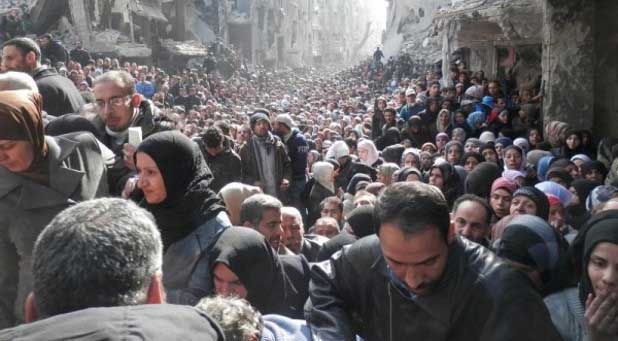Irbid
On our last day, we were in the city of Irbid, an hour and a half from Amman. We turned one of the main rooms of a congregation into a distribution center and invited a hundred refugee families to come and receive items, including food, clothes, games for the children, diapers, baby food and more.
The circumstances in Irbid are very hard. Almost 600,000 refugees live there. From a sanitary point of view, it is a disaster. The government cannot handle all the waste on the streets, so the refugees burn their piles of waste. The local population abuses the refugees. A member of the congregation told us that his landlord is trying to get him out of the apartment in order to rent it to Syrian refugees, the reason being that while he pays 50 dinars a month, Syrian refugees pay between 250 and 300 dinars a month.
Two or three refugee families share one apartment and are ready to pay a lot of money in order to not to live on the street. Jordanian citizens also rent them apartments, which are uninhabitable—such as shops, stores and industrial buildings. The Jordanians continually increase the prices and threaten to throw the people on the street if they refuse to pay.
Additionally, there is human trafficking, which I call “prostitution with a religious seal of approval.” There is a Muslim law that allows a man to marry a woman for a week or two, then to divorce her and return her to her family. The sheikhs and the rich people in Jordan try all the time to seduce refugee families with money. Mostly it is the case with older men who are trying to get young girls, whose ages many times do not surpass 14 or 15. The Syrian families are sometimes in such difficult situations that they agree to sell their girls for money.
Pain and Hope
The pain of the families is great. There is no family that has not lost loved ones. We saw a lot of widows and orphans, mothers who lost their children, people with missing body parts. Many refugees are injured. The war in Syria is a full-fledged catastrophe. We saw hatred and anger in their eyes. Everybody there is talking about revenge. When they speak about Assad and his army, there is murder in their eyes.
During our visits to families, we spoke with them about forgiveness and faith in Yeshua—that forgiveness and faith can set us free from all anger and purify our hearts from it. We hope that the humanitarian aid and our common prayers will lead them to the love of Yeshua and to the ways of God.
I returned to Israel with a lot of pain because of the sufferings these refugees have to go through. But I also returned with a lot of hope, knowing that just as there were many new believers after the war between Iraq and Iran, so also the war in Syria will unveil the evil and the lies of Islam, and many people will understand that God sent His only begotten Son to die for them, so that they may live.
For the original article, visit messiahsmandate.org.
















































